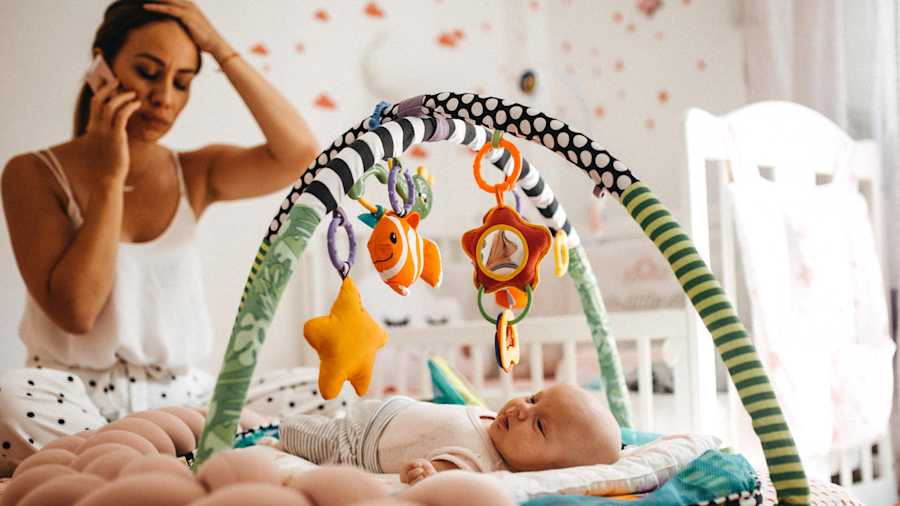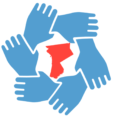
Welcoming a baby into your family is a joyful yet overwhelming experience. As your baby grows between 3 to 6 months, you may wonder when to call the doctor and when it’s okay to manage minor issues at home.
This guide will help you understand normal baby behaviors, common concerns, and red flags that require medical attention—all while reassuring you that you’re doing a great job!
Normal Baby Behaviors That May Seem Concerning
Babies change rapidly during these months, and some behaviors might seem unusual but are actually completely normal.
Irregular Sleeping Patterns – Babies at this age don’t always sleep through the night. Sleep regression, growth spurts, and teething can affect sleep (HealthyChildren.org, n.d.).
Frequent Spitting Up – It’s common for babies to spit up after feedings. As long as your baby is gaining weight and not uncomfortable, this is usually not a concern (AAP, n.d.).
Hiccups & Sneezing – Babies sneeze and hiccup a lot as their nervous and respiratory systems develop (Cleveland Clinic, n.d.).
Mild Rash or Baby Acne – Many babies experience minor skin rashes that clear up on their own (Mayo Clinic, n.d.).
Crying More in the Evening – Many babies go through a fussy period in the late afternoon or evening (also known as the “witching hour”). It peaks around 6-8 weeks and usually improves by 3-4 months (Johns Hopkins Medicine, n.d.).
These behaviors are all part of normal development—your baby is adjusting to life outside the womb!
When to Call the Doctor: Signs That Need Medical Attention
While most common concerns can be handled at home, some symptoms should not be ignored. Call your pediatrician if your baby experiences:
Fever Over 100.4°F (38°C) in a Baby Under 6 Months
- Fever can be a sign of infection in young babies, and prompt medical attention is needed (CDC, n.d.).
Dehydration Signs
- Fewer than 4 wet diapers in 24 hours
- No tears when crying
- Sunken soft spot (fontanelle)
- Dry mouth or excessive sleepiness
Persistent Vomiting (Not Just Spitting Up)
- If vomiting is forceful, green/yellow in color, or lasts more than 12 hours, contact your doctor (AAP, n.d.).
Difficulty Breathing
- Rapid breathing (more than 60 breaths per minute)
- Grunting, flaring nostrils, or pulling in ribs while breathing
- Bluish lips or face
- Call 911 if your baby is struggling to breathe.
Unusual Lethargy or Weakness
- If your baby is hard to wake up, limp, or has low energy for an extended period, seek medical attention.
Severe Rash with Fever or Blisters
- Mild rashes are normal, but a widespread rash with a fever or fluid-filled blisters should be checked by a doctor.
Bulging or Sunken Soft Spot (Fontanelle)
- A bulging fontanelle (soft spot) can be a sign of increased pressure in the brain.
- A sunken fontanelle can indicate dehydration (Cleveland Clinic, n.d.).
Signs of an Allergic Reaction
- Swelling of the face, lips, or eyes
- Difficulty breathing
- Hives or widespread rash after eating
- Severe food allergies require immediate medical attention (FARE, n.d.).
If you’re unsure, trust your instincts—your pediatrician wants to help and will never think you’re overreacting.
Common Baby Issues You Can Handle at Home
Some minor problems can be managed with simple at-home care:
Mild Colds or Congestion – Use a humidifier, saline drops, and gentle suction for stuffy noses (Mayo Clinic, n.d.).
Gas & Tummy Discomfort – Try burping baby often, gentle tummy massages, or bicycle leg movements.
Mild Diaper Rash – Use a thick diaper cream with zinc oxide, keep the area dry, and change diapers frequently (AAP, n.d.).
Constipation – For mild constipation, offer a little prune or pear juice (if over 4 months old) and do tummy time to help digestion.
Teething Discomfort – Offer a cool teething toy, gently massage gums, and use safe pain relief if needed (AAP, n.d.).
Most minor issues improve within a few days with patience, love, and simple care.
When to Go to the Emergency Room (ER)
Call 911 or go to the ER if your baby:
- Is struggling to breathe
- Is unresponsive or very difficult to wake up
- Has a seizure lasting more than 5 minutes
- Has a fever over 100.4°F (if under 3 months old)
- Has severe dehydration (no wet diapers in 12+ hours, extreme lethargy)
Reassurance for Parents
It’s completely normal to worry about your baby’s health. The first few months come with lots of questions, but you’re learning and doing an amazing job.
Trust yourself – You know your baby best.
Doctors are there to help – Never feel bad about calling.
Most common issues improve quickly – With love, time, and care.
Final Thoughts
Parenting comes with lots of decisions, but you’re not alone! If you’re unsure about your baby’s health, always reach out to your doctor—they’re happy to help. Trust yourself, follow your instincts, and enjoy these precious moments with your baby.
Would you like any infographics or additional sections added?
Video Resources:
English:
Spanish:
Additional Resources: Pediatric Help Lines & Nurse Advice
1. Westchester County Department of Health
- Phone: (914) 813-5000
- Website: https://health.westchestergov.com
- Description: Offers general maternal-child health services and guidance for when to contact a pediatrician.
2. Putnam County Department of Health
- Phone: (845) 808-1390
- Website: https://www.putnamcountyny.gov/health
- Description: Provides support on child wellness, immunizations, and infant illness concerns.
3. NYS Growing Up Healthy Hotline
- Phone: 1-800-522-5006
- Website: https://www.health.ny.gov
- Description: Statewide hotline offering parenting, health, and nurse triage guidance.
4. 2-1-1 Hudson Valley / United Way
- Phone: 2-1-1 or 1-800-899-1479
- Website: https://www.hudson211.org
- Description: Available 24/7 to connect families with local pediatric services, nurse advice, or urgent care resources.
Pediatric Clinics & Health Centers (Low or No Cost)
5. Open Door Family Medical Center
- Locations: Ossining, Mount Kisco, Port Chester, Sleepy Hollow, Mamaroneck, Brewster
- Phone: (914) 632-2737
- Website: https://www.opendoormedical.org
- Description: Offers pediatric care, developmental screenings, and sick visits. Sliding scale fees available.
6. Sun River Health (formerly HRHCare)
- Peekskill Pediatric Site Phone: (914) 734-8530
- Website: https://www.sunriver.org
- Description: Federally Qualified Health Center (FQHC) providing comprehensive pediatric care, with nurse advice line and 24-hour on-call provider services.
Parenting Education & Home Support
7. Child Care Council of Westchester
- Phone: (914) 761-3456
- Website: https://www.childcarewestchester.org
- Description: Provides parent workshops and referrals related to health and early childhood development.
8. Westchester Jewish Community Services (WJCS) – ParentChild+
- Phone: (914) 949-7699
- Website: https://www.wjcs.com
- Description: Offers early childhood home visits and support for families on infant health and development.
9. Healthy Families Putnam (via Maternal Infant Services Network – MISN)
- Phone: (845) 561-3575
- Website: https://misn-ny.org/healthy-families-putnam
- Address: 155 Main Street, Brewster, NY 10509
- Description: Provides home-based support, education, and guidance for families with babies under 1 year.
Emergency vs. Non-Emergency Support
10. Poison Control Center
- Phone: 1-800-222-1222
- Website: https://www.poison.org
- Description: 24/7 expert advice if a child ingests medication, chemicals, or household products.
11. Medicaid Managed Care Nurse Help Lines
- Note: Most NYS Medicaid plans include a 24-hour nurse line. Check the back of your Medicaid card for specific contact information.
- Purpose: Use for urgent-but-not-emergency decisions regarding your baby’s symptoms.
Educational Tools for Parents
12. HealthyChildren.org (American Academy of Pediatrics)
- Website: https://www.healthychildren.org
- Description: Includes a “Symptom Checker” tool and parent-friendly articles on when to call the doctor and when to monitor at home.
13. New York State Parenting Portal
- Website: https://www.nysparenting.org
- Description: Offers developmental guidance, home safety info, and child illness tips.
Legal Disclaimer: The information provided by our nonprofit is for informational purposes only and not a substitute for professional medical advice, diagnosis, or treatment. Always consult a qualified healthcare provider for medical concerns. We make no guarantees about the accuracy or completeness of the information and are not liable for any decisions made based on it. If you have a medical emergency, call 911 or seek immediate medical care.


